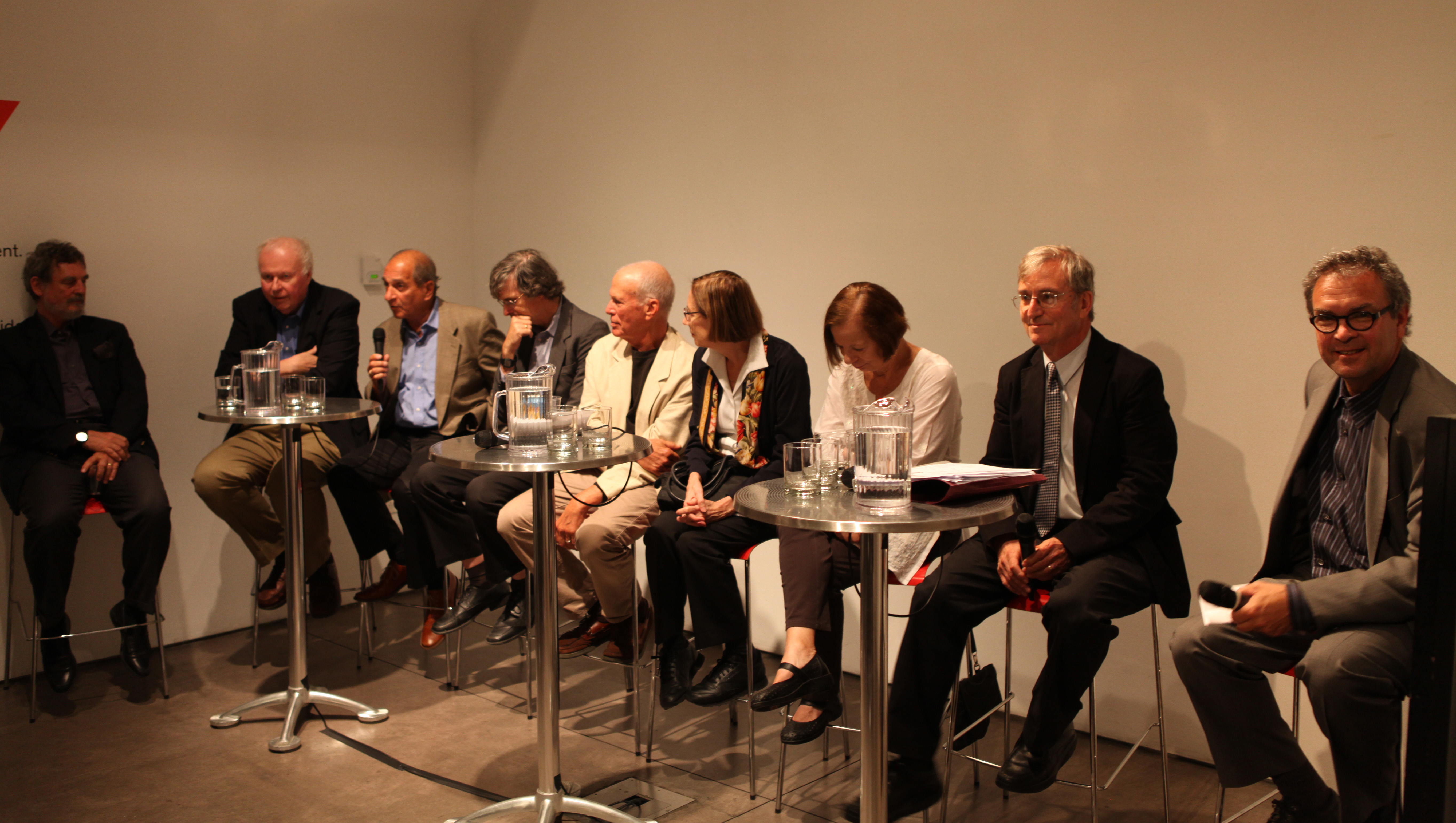by: ac
Reading the epic New York and Los Angeles: The Uncertain Future, however ominous the title, is actually an optimistic act. The 600-page tome will go down as a tremendous resource for a design community that is in desperate need of assessing evidence-based research of the highest quality. Orchestrated by sociologists David Halle and Andrew A. Beveridge, the collection of papers discusses the NYC/LA continuum in an impressive and lively manner. The Oculus Book Talk on 09.09.13, with its three-minute presentations and rock music impetus, broke new ground for the intersection of public policy and architectural thought.
The essays are heavy on analysis of policy-making in Los Angeles. They describe a dense tapestry of organizations, weighted equally with community-based organizing, radical grassroots activism, and the general mechanics of city government for the past four decades. The discussions about NYC illustrate tightly-controlled, top-down government policing, and a vast have-and-have-not culture. Oddly, reading this, LA looked good. Although New York has had some golden years, throughout the recent history of Los Angeles’s development, the power of the neighborhood organization, whether it results in NIMBYism or not, is impressive.
Gone is the hackneyed comparison that Los Angeles is a car culture and New York City is not. More urgent comparisons are made, such as NYC’s highly skilled immigrant population versus LA’s less skilled immigrants, and LA’s immigrant population being able to organize more effectively because 41% is from Mexico and NYC is much more diverse, thus diffusing priorities. The economic contrast, although nuanced, is fascinating. Both in her talk and in her essay “The New York and Los Angeles Economies from Boom to Crisis,” Harvard Graduate School of Design Senior Research Fellow Susan Fainstein put forth that NYC’s median income is lower than LA’s, and income inequality worsened in NYC during the recession; to add insult to injury, NYC’s greatest subsidies are to sports teams. Again, a progressive political base seems to have alleviated a similar condition in LA. One of my favorite essays was Martha Matsuoka and Robert Gottlieb’s “Environmental Policy Change in Los Angeles,” describing the powerful green constituency that has shaped the development and public policy of the Port of Los Angeles. The Green Trucks Campaign serves as a model of city agency and grass roots coalitions resulting in a progressive, healthy outcome.
However, the urban development story in LA is not all rosy. In the chapter “Planning Los Angeles: The Changing Politics of Neighborhood and Downtown Development,” by Andrew Deener, Erie Kogan, and Forrest Stuart, one learns of the Orwellian strategy enforced on LA’s Skid Row versus the smooth sailing for private development orchestrating the Disney Concert Hall and the Cathedral of Our Lady of Angels. In “Policing, Crime and Legitimacy in New York and Los Angeles: The Social and Political Contexts of Two Historic Crime Declines,” by Jeffery Fagan of Columbia University Law School, you understand that although there has been a record decline in crime, there has been a price to pay for draconian policing policies – in both cities. In light of lower crime rates, it is imperative that we reassess policing now, rather than continue overly-punitive measures; Stop and Frisk is a case in point.
AIANY Executive Director Rick Bell, FAIA, the only architect who contributed to the book and the Book Talk, illustrated the optimism that both the event and the book promote. As the band The Decembrists blasted its jaunty sentiments, Bell showed architectural work from both cities that denotes humanistic intensity and progressive flourish. I particularly appreciated the project in LA by Michael Lehrer, FAIA, for the Downtown Homeless Drop-In Center. The non-judgmental nature of the project – outdoor shelters for homeless men – seems to show the ultimate contrast in the LA/NYC discussion. Is there policy and architecture for tolerance and dignity in two of the world’s largest urban centers? All of the authors are searching for the answers.
Annie Coggan is a principal with Coggan and Crawford Architects, and teaches at the Fashion Institute of Technology and the School of Visual Arts in New York City.
Event: Oculus Book Talk: David Halle and Andrew A. Beveridge, New York and Los Angeles: The Uncertain Future
Location: Center for Architecture, 09.09.13
Speakers: Rick Bell, FAIA, Executive Director, New York Chapter of the American Institute of Architects; Andrew Beveridge, Professor of Sociology, Queens College and Graduate Center, CUNY; Jeffrey Fagan, Isidor and Seville Sulbacher Professor of Law, Columbia University; Susan Fainstein, Senior Research Fellow in Urban Planning, Harvard University; Nancy Foner, Distinguished Professor of Sociology, Hunter College and the Graduate Center, CUNY; David Halle, Professor of Sociology, University of California, Los Angeles; William Kornblum, Professor of Sociology, Graduate Center, CUNY; John Mollenkopf, Distinguished Professor of Political Science, Graduate Center, CUNY; Brendan O’Flaherty, Professor of Economics, Columbia University
Organizers: AIANY Oculus Committee

















